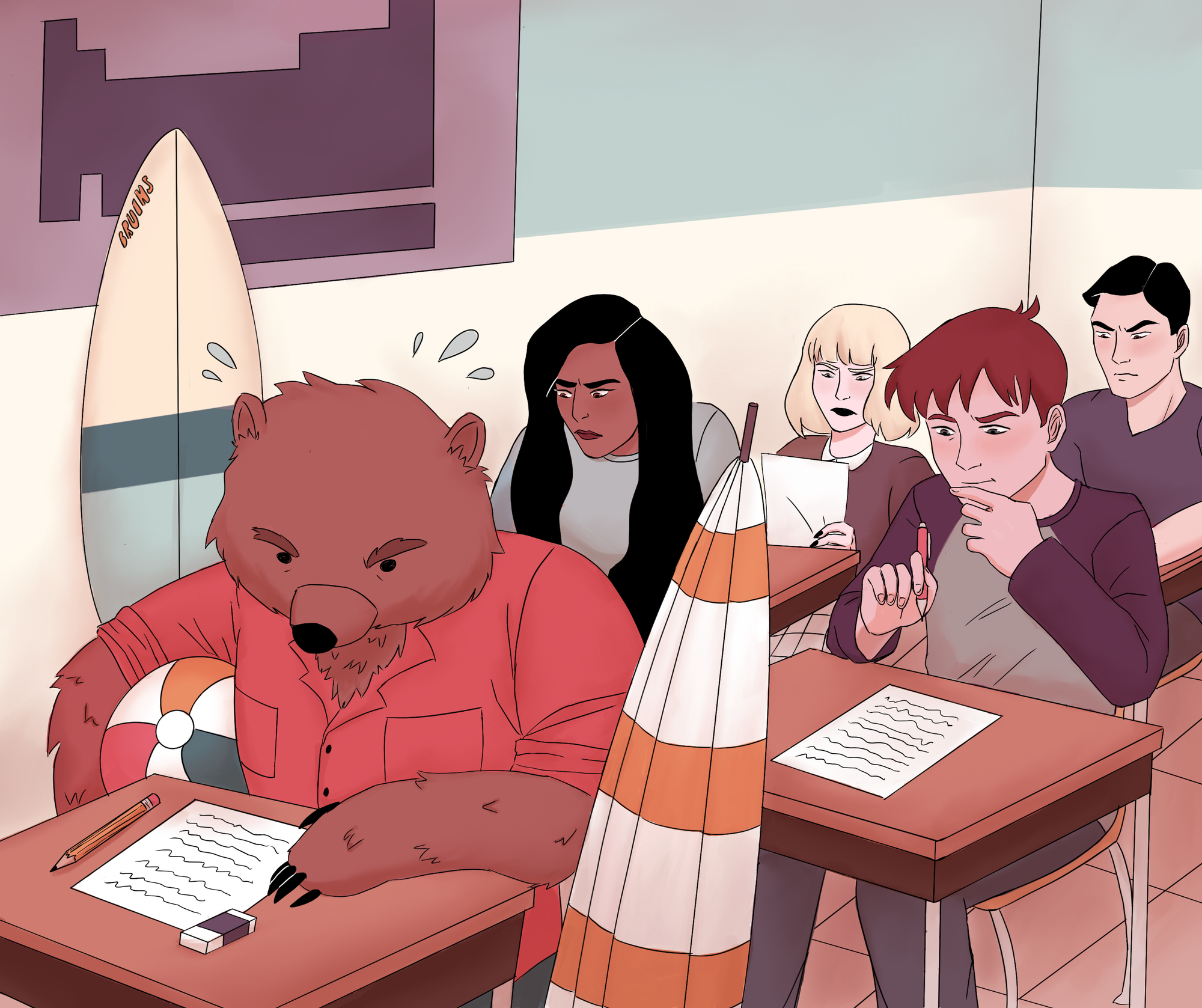The Quad: What summer learning loss is, steps students can take to prevent it

(Courtney Fortier/DailyBruin)

By Hanna Chea
Sept. 3, 2019 5:23 p.m.
For many students, summertime marks a season of ditching the books and putting the library on hold.
It’s a time when Bruins can focus on other activities, such as lounging in the sun, picking up a new hobby or hanging out with friends.
While the freedom of summer allows students to choose what they want to do with their time, there is a consequence to spending too much time away from the books: an almost universal learning loss slowly eating away at the mental preparedness necessary for the start of a new school year.
Since 1906, researchers have investigated the phenomenon often referred to as summer learning loss. Such studies define summer learning loss as the decrease in academic skill and knowledge over the course of the extensive summer break.
Investigations have yielded three major conclusions: Over summer vacation, student achievement scores decline by one month’s worth of learning during the school year, the decline for math is greater than that of reading and those at higher grade levels experience a greater loss of knowledge.
A 2008-2012 summer learning loss study using data from over a half-million students from second to ninth grade discovered that students lost between 25% to 30% of what they learned during the school year over the summer.
According to research conducted by Harris Cooper and his students at the University of Missouri, there is a greater degree of loss is evident in higher grade levels. This includes grade levels ranging from high school to college.
Researchers speculate the losses seen at higher levels are due to the cumulative loss of knowledge that occurs with each summer vacation.
Based on Cooper’s findings, students in higher education, including UCLA students, would certainly be in danger of losing academic knowledge over the summer as well.
If summer learning loss is digging into Bruins’ performance, one might expect a fall quarter class to perform worse than its winter/spring counterparts. However, consulting UCLA professors produces no such clean-cut results.
David A. Smallberg, a professor at UCLA’s school of engineering, taught a Computer Science 31 class both fall and spring quarter.
Smallberg said there is actually stronger performance in his fall quarter class. However, he said the difference is probably due to the greater amount of computer science students in his fall quarter class as compared to spring quarter.
“We’re talking two very different populations. It’s hard to compare the two classes,” Smallberg said. “Obviously the class with more people coming in as CS have more prior experience.”
By observing specific UCLA classes and student performance, the correlation between summer and learning loss is a complicated distinction. Aforementioned factors such as grade level and the amount of studying done by the student during the long break can influence the degree of learning loss. However, the performance of students within a specific UCLA course is also influenced by factors independent of learning loss – such as major, the number of students in a class, professor or course workload.
While achievement scores among different quarters are difficult to compare, the possibility of achievement scores varying within the course of one school year could also indicate learning loss.
Chris Surro, an economics professor at UCLA, said he observes learning loss over time periods even shorter than the summer season.
“I see a lot of learning loss throughout the year, actually. I also teach intermediate macro (in the spring) and there I feel like I have to reteach a lot of stuff,” Surro said. “It’s hard to fully understand the topic the first time you learn it, so you kind of need multiple classes to fully understand something and until you fully understand something you’re kind of just memorizing the steps, not actually learning it.”
These inconclusive results of learning loss among groups of UCLA students make it difficult to examine widespread summer learning loss. However, the phenomenon can also be experienced by individuals, who feel as though the long vacation halts progress.
Eunice Lee, a second-year molecular, cell, and developmental biology and pre-dental student, is one such case.
“I tend to work better when I’m busier,” Lee said. “So spending an entire summer each year without a strict schedule can definitely leave me a bit unprepared for the busyness of starting a new school year.”
The transition from a less productive summer to a busy and mentally taxing school year can leave students feeling unprepared. The lack of mental stimulation during the long breaks is a significant cause of summer learning loss.
During the summer season, adhering to an early sleep schedule and studying textbooks helps to keep the mind sharp and retain previously learned material, Lee said.
Four out of five undergraduate Bruins take summer classes at UCLA, an action that can help mitigate potential learning loss. However, for Bruins who are unable to enroll in summer sessions, staying on top of learning can be much more difficult.
Nonetheless, students who fear losing valuable progress over the summer do have options to prevent summer learning loss.
According to an Oxford Learning article, even two to three hours of dedicated studying a week can help prevent summer learning loss.
Alternatively to direct studying, research conducted by Andrew Loh indicates that picking up a new hobby can improve cognitive and critical thinking skills.
Investing in the right kind of screen time by switching to reading influential online blogs, downloading puzzles and brain teaser games or watching documentaries can also help alleviate the extent to which one may experience summer learning loss.
With the school year right around the corner, preparing to study and settle back into the daily college grind can be a transition that creeps up on you all at once – and a large part of this unpreparedness results from the educational loss students experience over the summer.
For students worried about the impending plethora of projects, papers and exams, a fun activity like learning the chords of a new instrument or engaging in an interesting new book can go a long way toward cutting back on the learning loss that’s been eating away at your hard work.

